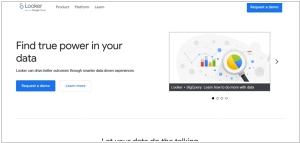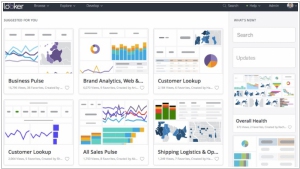Looker vs MicroStrategy
July 24, 2023 | Author: Michael Stromann
10

MicroStrategy is a leading global provider of enterprise software platforms for business intelligence (BI), mobile intelligence, and network applications. The best business decisions are driven by data. World class organizations operationalize business intelligence and embed analytics in their DNA. MicroStrategy supports a full range of analytic functionality, from stunning business dashboards to sophisticated statistical analysis and data mining. Our platform gives you the flexibility to start small and seamlessly scale to an enterprise deployment.
Looker and MicroStrategy are both powerful business intelligence (BI) platforms, each offering unique features to help businesses analyze and visualize their data. Looker is a cloud-based BI tool known for its user-friendly interface and intuitive data modeling capabilities. It allows users to explore data and create interactive dashboards and reports through its LookML language for data modeling. Looker's strength lies in its ability to provide real-time insights and foster a culture of data-driven decision-making within organizations. On the other hand, MicroStrategy is an enterprise-level BI platform known for its scalability and robust analytics capabilities. It offers a wide range of data visualization options and supports complex data analysis tasks. MicroStrategy's strength lies in its ability to handle large datasets and deliver high-performance analytics.
See also: Top 10 Business Intelligence software
See also: Top 10 Business Intelligence software
Looker vs MicroStrategy in our news:
2022. Google unifies its BI services under the Looker brand

Google Cloud has made an exciting announcement, revealing its decision to consolidate all of its business intelligence products under the unified brand of Looker. This consolidation brings together Looker, Data Studio, and core Google technologies such as artificial intelligence (AI) and machine learning (ML). Google emphasizes that this integration goes beyond traditional dashboards, which are the specialty of Google Data Studio, enabling businesses to incorporate data into various workflows and applications for informed decision-making. As a part of this transition, Google Data Studio will now be known as Looker Studio. Looker itself was a startup that Google acquired in 2020 for an impressive $2.6 billion. With this unified approach, Google officially enters the competitive landscape, challenging established players like Tableau, Microsoft Power BI, and QlikView.



